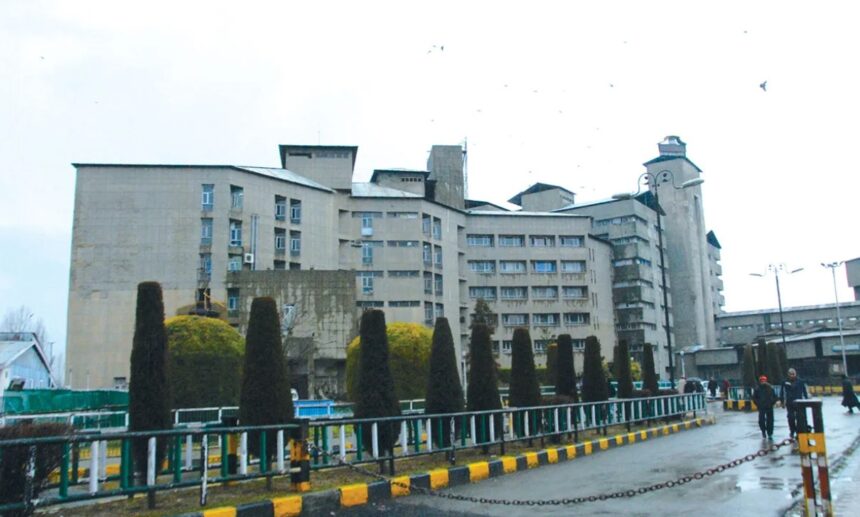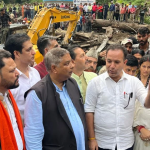PATIENT CARE FIRST
Sher-i-Kashmir Institute of Medical Sciences (SKIMS) has been a cornerstone of healthcare in Kashmir since its inception. Renowned for its specialized services, SKIMS was envisioned to be a beacon of excellence in medical education, research, and patient care. However, over the years, the institution’s autonomy has been eroded, adversely impacting its functionality, governance, and ability to prioritize patient care. Restoring SKIMS’s autonomous status is imperative for realigning its operations with the vision of its founders and placing patient care at the forefront.
On the 42nd Foundation Day of Sher-i-Kashmir Institute of Medical Sciences (SKIMS), Chief Minister Omar Abdullah announced the restoration of the institution’s autonomous status, bringing renewed hope for its revival as a premier healthcare facility in Jammu and Kashmir. In his inspiring speech, the Chief Minister emphasized the urgent need to prioritize patient care over political considerations, urging all stakeholders to unite for the greater good. The decision to restore SKIMS’s autonomy promises to empower the institution to implement patient-centered reforms, enhance resource management, and foster academic and research excellence. This move aligns with the vision of its founders to make SKIMS a beacon of medical care in the region.
Hospitals are sacred spaces dedicated to healing and empathy, and they deserve insulation from the divisiveness of politics. As emphasized by the Chief Minister, patient welfare should transcend political differences, with all efforts directed towards creating an environment of compassion and efficiency. Restoring SKIMS’s autonomy is not just a policy decision but a symbolic gesture underscoring the importance of healthcare in society. It is a call to action for everyone to support this institution in delivering the highest standards of care, innovation, and service to the people of Jammu and Kashmir.
Historical Perspective and the Role of Autonomy
SKIMS was established as a tertiary care institution with a unique mandate to provide specialized healthcare, conduct cutting-edge research, and train future generations of healthcare professionals. Autonomy was a defining feature of its governance model, ensuring administrative flexibility, academic independence, and streamlined decision-making. This status enabled SKIMS to adapt swiftly to healthcare challenges, attract talented professionals, and implement patient-centered policies.
The dilution of its autonomy, however, has subjected SKIMS to bureaucratic red tape interference, and delays in decision-making. The institution now grapples with challenges that hinder its ability to deliver quality care. Restoring its autonomy is critical for addressing these issues and ensuring the institution’s original mandate is upheld.
Challenges Stemming from Reduced Autonomy
- Bureaucratic Hurdles-The integration of SKIMS into a centralized administrative structure has resulted in inefficiencies. Decisions regarding procurement, staffing, and resource allocation are delayed due to layers of approval. For a hospital catering to critical care patients, such delays can be life-threatening.
- Recruitment and Retention of Talent -Autonomous institutions have the flexibility to recruit and retain highly skilled professionals by offering competitive salaries, academic freedom, and growth opportunities. SKIMS’s diminished autonomy has restricted its ability to attract top-tier talent, leading to a brain drain to corporate hospitals or institutions outside Kashmir.
- Compromised Research and Innovation-SKIMS was envisioned as a hub for medical research. Bureaucratic control over funding and approvals has stifled research initiatives. Researchers face challenges in securing grants, accessing resources, and collaborating with international institutions, limiting the scope and quality of scientific output.
- Declining Patient-Centered Care-The administrative focus on compliance rather than care has shifted priorities away from patients. Overcrowded facilities, understaffed departments, and outdated equipment are common complaints. Without autonomy, it is difficult to implement reforms that directly improve patient experiences and outcomes.
From Clipped Wings to the Case for Restoring Autonomy
- Strengthening Governance-Autonomy would allow SKIMS to establish an empowered board of directors comprising medical professionals, administrators, and patient advocates. This governance model ensures that decisions are made in the best interests of the institution and its patients, free from external interference.
- Enhancing Resource Management-An autonomous SKIMS could allocate resources more efficiently. Procurement of essential equipment, hiring of staff, and upgradation of infrastructure could be expedited. This agility is crucial for maintaining high standards of patient care and adapting to emerging healthcare challenges.
- Promoting Academic Excellence-Restoring autonomy would revive SKIMS’s academic reputation by fostering a culture of innovation and academic freedom. Faculty and students would benefit from enhanced research opportunities, collaborations, and access to global advancements in medical science.
- Prioritizing Patient Care-Autonomy enables institutions to develop patient-centric policies, streamline processes, and adopt advanced technologies. For SKIMS, this could mean shorter wait times, improved diagnostic facilities, and better treatment outcomes.
Lessons from Other Autonomous Institutions-Globally, autonomous medical institutions such as the All India Institute of Medical Sciences (AIIMS) have set benchmarks in healthcare delivery and medical education. Their success is attributed to governance models that prioritize institutional autonomy, enabling them to focus on patient care, research, and academic excellence. Closer home, SKIMS had once achieved similar milestones under its autonomous framework. Reviving this model can position it among the elite medical institutions in the country, fulfilling its potential to serve as the premier healthcare provider in Kashmir.
Restoring Autonomy: A Roadmap
- Legislative Reforms-The state government must introduce legislative changes to reinstate SKIMS’s autonomy. Clear guidelines should delineate the roles and responsibilities of the institution, ensuring minimal interference while maintaining accountability.
- Strengthening Leadership- SKIMS needs visionary leaders; hope is power, a lot more expectations have been attached to the current team Leader DR. Ashraf Ganie to navigate the institution through its challenges. The appointment of a dynamic director with administrative independence is always crucial for driving reforms and fostering a culture of excellence, but with clipped wings asking him to fly heights is an unfair proposition.
- Community Engagement-Involving patients, civil society, and healthcare professionals in the decision-making process can ensure transparency and alignment with community needs. A patient advisory council could be instrumental in voicing concerns and shaping policies.
- Monitoring and Evaluation-Autonomy does not imply a lack of accountability. Establishing robust mechanisms for monitoring performance, evaluating outcomes, and ensuring financial transparency will be critical for sustaining trust and efficiency.
Benefits of Autonomy for Patient Care
Restoring SKIMS’s autonomy would directly translate the recruitment process of necessary care providers into improved patient care. Key benefits include:
- Reduced Waiting Times: Streamlined processes for appointments, diagnostics, and treatments.
- Upgraded Facilities: Investments in modern equipment and infrastructure.
- Enhanced Quality of Care: Recruitment of skilled professionals and adoption of evidence-based practices.
- Holistic Patient Support: Integration of counselling, rehabilitation, and support services.
SKIMS was established with the noble vision of transforming healthcare in Kashmir. However, the erosion of its autonomy has undermined its ability to fulfill this promise. Restoring its autonomous status is not just an administrative necessity but a moral imperative to prioritize patient care. By reclaiming its independence, SKIMS can renew its commitment to excellence in healthcare, research, and education. This restoration would mark a pivotal step towards building a resilient healthcare system in Kashmir, where patient care is not just a priority but a promise.
(The author is a Surgeon at Mubarak hospital , ex Alumni of SKIMS, National and Certified professional in Healthcare policy , planning ,analysis and Quality reforms and can be reached at: [email protected])









